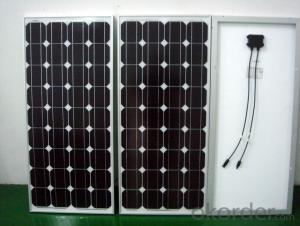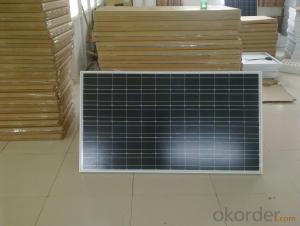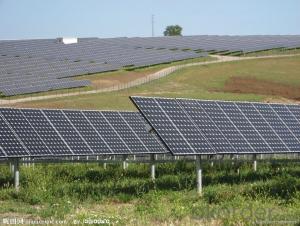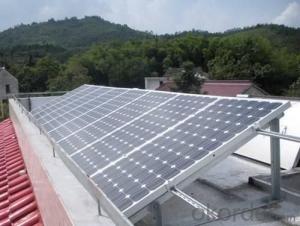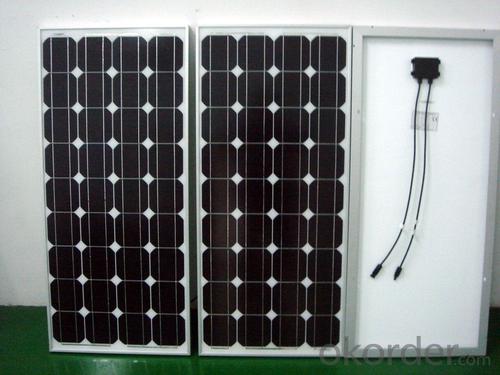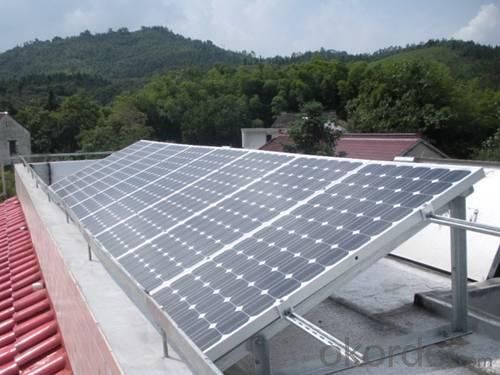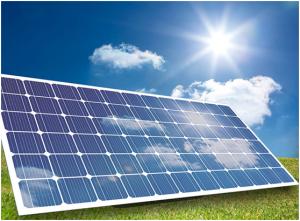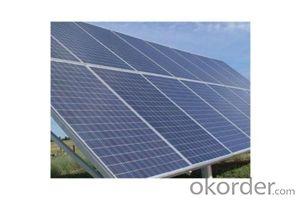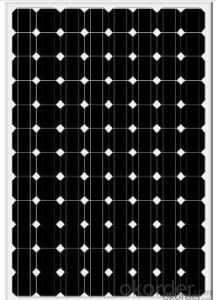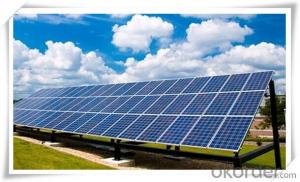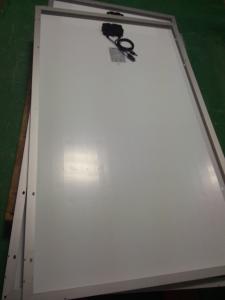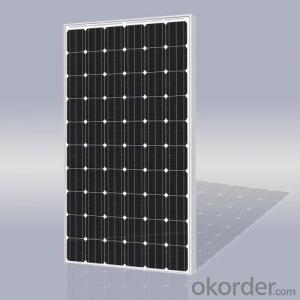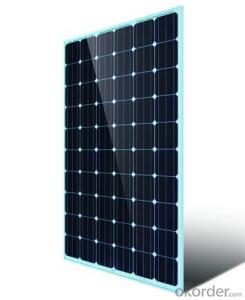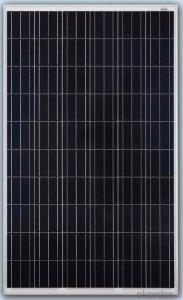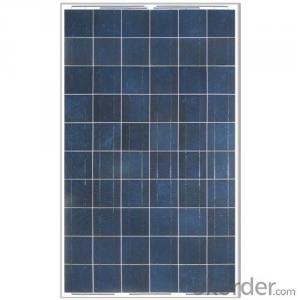Poly 240W Solar Panels on Condo - CE/IEC/TUV/UL Certificate
- Loading Port:
- Shanghai
- Payment Terms:
- TT OR LC
- Min Order Qty:
- 1000 watt
- Supply Capability:
- 100000000 watt/month
OKorder Service Pledge
OKorder Financial Service
You Might Also Like
Quality and Safety of Poly 230W Solar Panel CE/IEC/TUV/UL Certificate
1. Rigorous quality control meets the highest international standards.
2. High-transmissivity low-iron tempered glass, strong aluminium frame.
3. Using UV-resistant silicon.
4. IS09001/14001/CE/TUV/UL
Warranties of Poly 230W Solar Panel CE/IEC/TUV/UL Certificate
1. 10 years limited product warranty
2. 15 years at 90% of the minimal rated power output
3. 25 years at 80% of the minimal rated power output
Technical date of Poly 230W Solar Panel CE/IEC/TUV/UL Certificate :
ITEM NO.: | Poly 156*156 cell ,60pcs . Power range from 230Wp-260Wp | ||||||
Maximum Power(W) | 230 | 235 | 240 | 245 | 250 | 255 | 260 |
Optimum Power Voltage(Vmp) | 29.4 | 29.5 | 29.7 | 30.1 | 30.3 | 30.5 | 30.7 |
Optimum Operatige Current(Imp) | 7.83 | 7.97 | 8.08 | 8.14 | 8.25 | 8.37 | 8.48 |
Open Circuit Voltage(Voc) | 36.7 | 36.8 | 36.9 | 37.1 | 37.3 | 37.5 | 37.7 |
Short Circuit Current(Isc) | 8.52 | 8.59 | 8.62 | 8.65 | 8.69 | 8.73 | 8.78 |
Solar Cell: | 156*156 Poly | ||||||
Number of Cell(pcs) | 6*10 | ||||||
Brand Name of Solar Cells | JA Cell, Bluesun Cell | ||||||
Size of Module(mm) | 1650*992*40/45/50 | ||||||
Cable & Connector Type | Pass the TUV Certificate | ||||||
Frame(Material Corners,etc.) | Aluminium-alloy | ||||||
Back sheet | TPT | ||||||
Weight Per Piece(KG) | 19.5KG | ||||||
FF (%) | 70-76% | ||||||
Junction Box Type | Pass the TUV Certificate | ||||||
Tolerance Wattage(e.g.+/-5%) | ±3%, or 0-3% | ||||||
Front Glass Thickness(mm) | 3.2 | ||||||
Temperature Coefficients of Isc(%) | +0.04 | ||||||
Temperature Coefficients of Voc(%) | -0.38 | ||||||
Temperature Coefficients of Pm(%) | -0.47 | ||||||
Temperature Coefficients of Im(%) | +0.04 | ||||||
Temperature Coefficients of Vm(%) | -0.38 | ||||||
Temperature Range | -40°C to +85°C | ||||||
Surface Maximum Load Capacity | 5400Pa | ||||||
Allowable Hail Load | 23m/s ,7.53g | ||||||
Bypass Diode Rating(A) | 12 | ||||||
Warranty | 90% of 10 years, 80% of 25 years. | ||||||
Standard Test Conditions | AM1.5 1000W/ 25 +/-2°C | ||||||
Packing | carton or pallet | ||||||
1*20' | 14 Pallets / 316pcs | ||||||
1*40'STD | 25 Pallets / 700pcs | ||||||
Diagram of Poly 230W Solar Panel CE/IEC/TUV/UL Certificate
 Diagram of Poly 230W Solar Panel CE/IEC/TUV/UL Certificate
Diagram of Poly 230W Solar Panel CE/IEC/TUV/UL Certificate
Standard production line of Factory
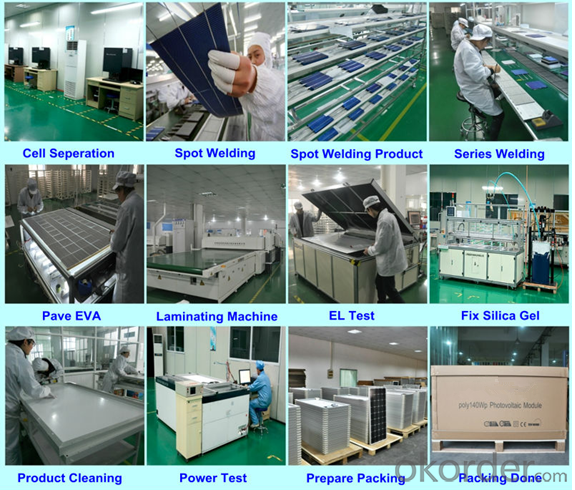
Packaging of Poly 230W Solar Panel CE/IEC/TUV/UL Certificate
u Normally packing: 1pc/2pcs/3pcs/10pcs/25pcs per carton
u Individual packing requirement is acceptable.
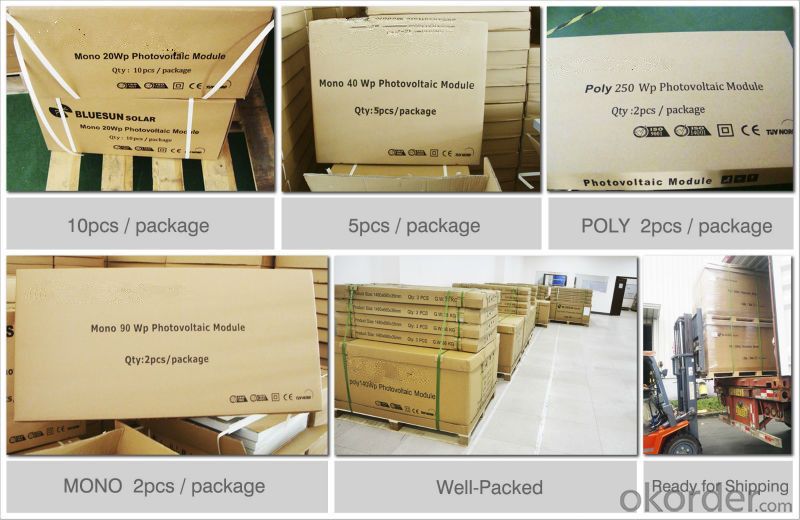
Shipping of Poly 230W Solar Panel CE/IEC/TUV/UL Certificate
By Sea | Delivery from Shanghai or Ningbo seaport |
By Air | Departure from Shanghai Pudong Airport |
By Express | Post by DHL, EMS, UPS, TNT. |
FAQ of Poly 230W Solar Panel CE/IEC/TUV/UL Certificate
(1) Can you offer the test report of the module?
Sure. All the solar modules must pass necessary tests including EL test and ultra-red test and other visual test of the apperance, and the test report presents all the detailed data of the modules.
(2) How to confirm about the quantity and the type of solar module?
It depends on the solar system where you want to put into use the solar modules. We have experienced engineers to design for your order and you need to give more information to fix the details.
- Q: How do solar panels affect the local job market?
- Solar panels can have a positive impact on the local job market by creating new employment opportunities. The installation, maintenance, and manufacturing of solar panels require skilled and unskilled workers, thus stimulating job growth in the renewable energy sector. Additionally, the shift towards solar energy can lead to the creation of new businesses and industries, further contributing to job creation and economic development in the local community.
- Q: Are there any tax credits available for solar panel installation?
- Yes, there are tax credits available for solar panel installation. The federal government offers a solar investment tax credit (ITC) that allows homeowners and businesses to deduct a percentage of the cost of their solar panel system from their federal taxes.
- Q: I was trying to figure out if I could run an electric heater off of a solar panel, but I don't understand these electric convertion factors and stuff. Would it work? (I know it'll only work in the daytime and stuff.)SOLAR PANELPeak Power 95W PTC Watts 73.0WVoc 30.7VPeak Voltage 24.4VIsc 8.6APeak Current 7.96A HEATERInput: 20 V/60 Hz ,500 W/5,200 BTU
- A 500 watt water heater is very small. Most are over 5000 watts. But even a water heater that small would not heat water with a 95 watt solar panel. Inverting the 24 volt to 20 volt would still give you 95 watts of power. A little short of the 500 needed. Sorry. Solar is cool but not practical for large loads unless you install more panels.
- Q: Can solar panels be damaged by hail or extreme weather?
- Yes, solar panels can be damaged by hail or extreme weather. Hailstorms with large-sized hailstones can cause physical damage to the solar panels, such as cracks or shattered glass. Extreme weather events like strong winds, heavy snowfall, or storms can also potentially damage the panels or dislodge them from their mounts. It is important to ensure proper installation and employ protective measures, such as using hail-resistant materials or installing panels at appropriate angles, to minimize the risk of damage.
- Q: Can solar panels be installed on a building with historical significance?
- Yes, solar panels can be installed on a building with historical significance. Many historical buildings have successfully incorporated solar panels into their design without compromising their architectural integrity. This allows for the preservation of historical structures while also promoting sustainable energy practices.
- Q: How do solar panels affect the property's energy management strategy?
- Solar panels can significantly impact a property's energy management strategy by providing a renewable and sustainable source of electricity. By harnessing solar energy, the property can reduce its dependence on traditional power sources, lower energy costs, and decrease its carbon footprint. Solar panels can also help to stabilize energy prices, as they generate electricity during peak demand periods, reducing the need to purchase electricity from the grid. Additionally, solar panels can provide a reliable source of backup power during grid outages, enhancing the property's energy resilience. Overall, solar panels offer numerous advantages to a property's energy management strategy, promoting sustainability, cost savings, and energy independence.
- Q: Where in the world are solar panels used. If it is used widespread across a continent just say which continent, other than that, just name the country. So where are solar panels used often?
- Solar panels can be used anywhere in the world. The only requirement is that there is sufficient sunlight to power the solar panels and in many developing countries, solar energy is used to heat water.
- Q: Can solar panels be used in remote areas with no access to the grid?
- Yes, solar panels can be used in remote areas with no access to the grid. Solar panels generate electricity from sunlight, which can be stored in batteries for use during nighttime or cloudy days. This off-grid solar system allows for a reliable and sustainable power source in remote locations, providing electricity for various purposes such as lighting, charging devices, and powering small appliances.
- Q: hi guys, i need help, okay lets say i decide to put solar panels near a place where its inhabitated by people, what kinda of environmental factors should i consider? Will the solar panels cause any damage to the enviromnent around it? Will it affect the plant and animals around it? should i consider the weather? its for my class so if u guys can help thankx.
- You would need to consider how much sun your area gets on average. You would need to do a cost/benefit analysis to decide if you will be saving money eventually. Environmentally, it would not affect the plants or animals around it, except those it might block the sun from. Meaning, the grass growing in the shade of the panels will probably die out, but that goes for anything that would cast shade for the majority of the time. Solar panels are simply rechargers for the batteries it's hooked up to. No different than a cell phone charger affects the area, people or plants around it. If it is a worry, make some orgonite and place it around the panels. :)
- Q: How much does 000 square feet of solar panels cost? This is for a pool with dimensions 75ft by 25ft? How much will it cost including installation fee and the water heater?
- My Father-in-Law had around 300sqft of solar panels installed for the equivalent of around ?3000 or $5000. These were just the cheap and relatively inefficient black plastic tubes that were installed on his roof. This was in South Africa where the labour rates are quite cheap. The system works okay and heats a 40ft x 20ft outdoor pool to over 30C in the height of summer. Rather than a pool heater, I think it might be good to look at an air source heat pump to help heat the water in Autumn/Winter when you don't get enough sun to heat the pool. These will be expensive (over $5000), but they will use less than 30% of the electricity of a standard electric water heater. Just the solar panels could cost you $5-20K including fitting.
Send your message to us
Poly 240W Solar Panels on Condo - CE/IEC/TUV/UL Certificate
- Loading Port:
- Shanghai
- Payment Terms:
- TT OR LC
- Min Order Qty:
- 1000 watt
- Supply Capability:
- 100000000 watt/month
OKorder Service Pledge
OKorder Financial Service
Similar products
Hot products
Hot Searches
Related keywords
